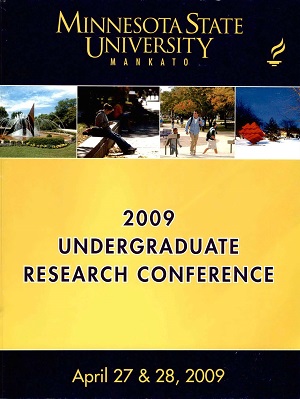The Use of Teenlect in Adolescents with William Syndrome and Their Typically Developing Peers
Location
CSU Ballroom
Start Date
27-4-2009 1:00 PM
End Date
27-4-2009 3:00 PM
Student's Major
Speech, Hearing, and Rehabilitation Services
Student's College
Allied Health and Nursing
Mentor's Name
Patricia Hargrove
Mentor's Department
Speech, Hearing, and Rehabilitation Services
Mentor's College
Allied Health and Nursing
Description
This project investigated teenlect in adolescents with William syndrome. William syndrome is a developmental disability characterized by cognitive impairment and unique strengths and weaknesses in language skills. Speakers with William syndrome "have quite extensive and strong, language expression and acquisition. However, the ability to speak those words, in addition to complications with visuospatial recognition, can be impaired. What is commonly seen, then is a child with advanced vocabulary and a keen skill for grammar, with a poor ability to express speech and a poor ability to perform in areas that involve abstract thinking" (Cadena, 2007). Our research is focused on teenlect, which is a type of dialect that is used frequently by adolescents. Specifically, we examined the conversations for six targeted words/phrases that are common in teenlect dialogue. These words/phrases are you know, like, cool, whatever, and stuff, or something. We reviewed speech samples of twelve adolescents with William syndrome (WS) and twelve typically developing (TD) peers. The data had been collected and transcribed by previous graduate clinicians who had conversed individually with the participants. The transcriptions were coded so that we would not form any predispositions about the status (i.e., WS or TD) of participants. We analyzed the data by calculating the occurrence of our target words. The results will be discussed in light of the current literature on William syndrome.
The Use of Teenlect in Adolescents with William Syndrome and Their Typically Developing Peers
CSU Ballroom
This project investigated teenlect in adolescents with William syndrome. William syndrome is a developmental disability characterized by cognitive impairment and unique strengths and weaknesses in language skills. Speakers with William syndrome "have quite extensive and strong, language expression and acquisition. However, the ability to speak those words, in addition to complications with visuospatial recognition, can be impaired. What is commonly seen, then is a child with advanced vocabulary and a keen skill for grammar, with a poor ability to express speech and a poor ability to perform in areas that involve abstract thinking" (Cadena, 2007). Our research is focused on teenlect, which is a type of dialect that is used frequently by adolescents. Specifically, we examined the conversations for six targeted words/phrases that are common in teenlect dialogue. These words/phrases are you know, like, cool, whatever, and stuff, or something. We reviewed speech samples of twelve adolescents with William syndrome (WS) and twelve typically developing (TD) peers. The data had been collected and transcribed by previous graduate clinicians who had conversed individually with the participants. The transcriptions were coded so that we would not form any predispositions about the status (i.e., WS or TD) of participants. We analyzed the data by calculating the occurrence of our target words. The results will be discussed in light of the current literature on William syndrome.
Recommended Citation
Wandrie, Jessica; Emily Wallin; Kahlynn Bach; Kelly Olson; and Jennifer Worrall. "The Use of Teenlect in Adolescents with William Syndrome and Their Typically Developing Peers." Undergraduate Research Symposium, Mankato, MN, April 27, 2009.
https://cornerstone.lib.mnsu.edu/urs/2009/poster-session-B/20




